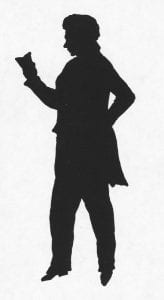Isaac Harby, the Election of 1824, and the Rise of Andrew Jackson
By Daniel Gullotta, Research Fellow at Pearlstine/Lipov Center for Southern Jewish Culture, October 2019
In Dinesh D’Souza’s 2018 “documentary” Death of a Nation, the political provocateur sat down with white nationalist and Alt-Right figure Richard Spencer to discuss American history. In the interview, D’Souza asked Spencer who his favorite president was, and he responded, “There’s something about [Andrew] Jackson.” D’Souza was quick to point out that Jackson was the founder of the Democratic Party, as if it were a gotcha moment on tape. Spencer shrugged. Because of my interest in Jackson and my research on how religion shaped his voters and the rise of the Democratic Party, this interview was sent to me by a colleague for comment. While it was another sign of Jackson’s decline in public reception, it did strike me as interesting (and a little funny) that an anti-Semite and white supremacist like Spencer would pick Jackson as a hero—Jackson, who was notably popular within Jewish circles in the early Republic.

“General Jackson in 1819,” John Wesley Jarvis. Metropolitan Museum of Art.
While sources related to Jewish political activity in the Age of Jackson are limited, one key figure is Charleston’s Isaac Harby. Best known today as an innovator of Reform Judaism, Harby was more famous then as a contributor to and editor of several newspapers, including the Southern Patriot, City Gazette, and Charleston Mercury. Harby wrote several pieces in favor of Jackson under the pseudonym “Junis.” Knowing that significant papers relating to Harby are housed in the College of Charleston’s Jewish Heritage Collection at Addlestone Library, I was delighted to receive a fellowship from the Pearlstine/Lipov Center for Southern Jewish Culture to continue my research into Harby’s alliance with the Jacksonian coalition and the role Jews played in helping form what we know today as the Democratic Party.
Upon arriving in Charleston, my first instinct was to study everything and anything pertaining to Isaac Harby. Among Harby’s papers were the handwritten drafts of his writings supporting Andrew Jackson for president. Harby lauded Jackson’s war efforts during the Battle of New Orleans (1815), characterized Jackson as the true heir of Thomas Jefferson, and defended the more worrisome elements of Jackson’s character, such as his invocation of martial law and his illegal invasion of Spanish Florida. While the bulk of the original texts are identical to what was published, it seems that Harby had to reign in his gushing for Jackson. Much of the praise Harby heaps onto Jackson was cut, and I speculate this was done to present a humbler image of the candidate or maybe to present the author as a more objective observer of the presidential race. While I discovered no startling new document, it was remarkable to see Harby’s unfiltered praise for Jackson on full display.
What struck me most was the anti-northern, anti-Adams, and anti-abolitionist aspects of Harby’s writings. Though I had read these documents over and over again, perhaps it was being in Charleston—in the South—that made me pay attention to Harby’s relationship with slavery. With the help of Dr. Dale Rosengarten and reference archivist Sam Stewart, I was able to connect more of the dots, including Harby’s reporting on the aborted slave revolt led by a Denmark Vesey in Charleston in 1822. Scholars debate how real or imagined the slave revolt was, but even a threat of rebellion was enough to terrify white Southerners. Harby’s City Gazette described Vesey’s plot as “a scheme of wildness and of wickedness” and blamed the “poison” of anti-slavery politicians following the Missouri Comprise in 1820.

Andrew Jackson offered fifty dollars for this enslaved man’s return, “and ten dollars extra for every hundred lashes any person will give him.”
Given that Jackson was known as an unapologetic slaveholder and a brutal executor of rebellious slaves, Harby would have found him all the more appealing in the years following the Vesey incident. All of this made me consider the state of Jewish slaveholding in Charleston at the time of Jackson’s rise to the presidency. According to Ira Rosenswaike’s estimates, out of the 109 Jewish households living in Charleston in 1820, 92 families held people in bondage, totaling roughly 481 slaves out of the total enslaved population of approximately 12,652. Based on these statistics, Charleston’s Jewish population owned about 3.8 percent of the city’s enslaved population. Southern Jews, like their southern Christian fellow citizens, no doubt desired to see a president like Andrew Jackson endeavor to protect and promote their southern interests.
While I had hoped to find writings advocating religious liberty for Jews and promoting Jackson as a Jeffersonian defender of the separation of church and state, my research led me back to slavery, time and time again, as the main concern for Harby. At first this was disappointing, but soon it became more interesting, as it made me consider the changing nature of American politics for Jews in the early Republic. It occurred to me that the lack of these concerns, compared to the election of 1800 (where Jewish supporters of Thomas Jefferson were lambasted as anti-Christian radicals by John Adam’s Federalists), marked an evolution of Jewish alliances and signaled the integration of Jews within southern society and its “peculiar institution.” It is remarkable to me how much Isaac Harby’s concerns and interests match those of his white Christian neighbors and how similar his pro-Jackson writings are to those of other Jacksonians at the time. Using rhetoric that would soon become creedal for Jacksonians, Harby declared it was “the duty of Republicans…to oppose, by every means, certain doctrines, which have of late been disseminated by the advocates of banks and armies, by the admirers of courts and by the abolition society and its secret branches.” With the collapse of the first-party system and new challenges facing the American nation, Harby had transitioned from a Jeffersonian Jew to a Jacksonian Jew.




